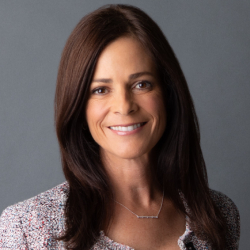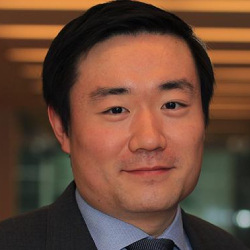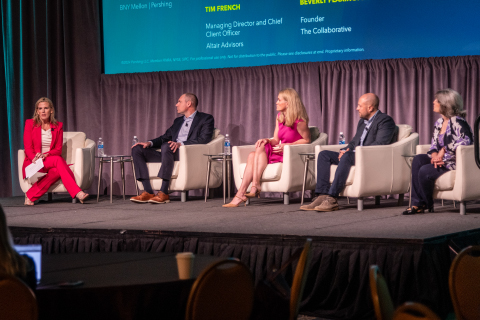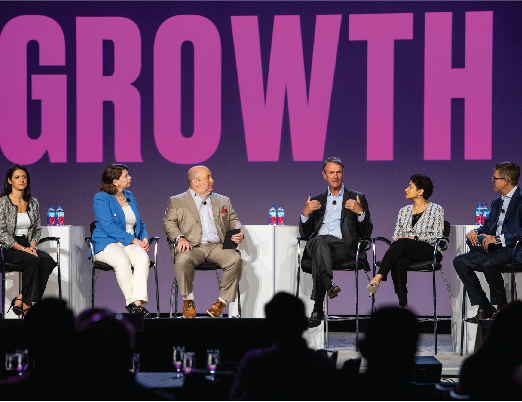July 5, 2024
BEN HARRISON
Head of Wealth Solutions
Once again, I had the honor of hosting four industry luminaries on the main stage at INSITE to discuss the current state of wealth management, as well as imminent changes and predictions for what comes next.
Our panel of experts represented a dynamic cross section of the wealth segment.
Shannon Eusey
“The Competitor”
CEO, Beacon Pointe Advisors
Jimmy Zhao
“The C-Suite Whisperer”
Partner, Head of North American Retirement Practice, McKinsey & Company
Lauren Seidman
“The Investor”
Managing Director, Stone Point Capital
Marianna Lopert-Schaye
“The Innovator”
Global Head of Strategic Partnerships & Innovation, BNY
Read on for highlights from this year’s key topics as well as valuable insights from some of the industry’s most compelling thought leaders.
1. Bull Market for Advice: The Rising Demand for Wealth Management
The wealth management industry is experiencing significant tailwinds, with demand for financial advice growing steadily. For our first topic, I had the panelists tell me a bit about the current state of the wealth market and how we got here.
According to Jimmy Zhao, the industry has more than doubled in size over the past decade, from $23 trillion in assets in 2013 to an impressive $53 trillion today. This growth is not only driven by market appreciation but also by substantial inflows. As Zhao noted, “Over the last decade, $13 trillion in inflows have come into the industry. That’s remarkable growth — not only in its magnitude, but in its stability.”
Zhao pointed out that the industry has reached “peak advisor” with around 295,000 advisors. This growth reflects new clients seeking advice and existing clients entrusting more assets to their advisors, especially during unstable times. “The apex of organic growth was in 2021, during what we recognize as a COVID bump,” Zhao noted. “I believe that number represents the value that financial advisors bring in moments of real uncertainty.”
Marianna Lopert-Schaye attributed the recent advisor uptick to a broader swath of the population wanting access to independent finance advice. “We refer to these individuals as HENRYs —High Earners, Not Rich Yet— and they’re interested in an experience that is beyond retail robo-advisors and single stock investing.”
“Over the last decade, $13 trillion in inflows have come into the industry. That’s remarkable growth — not only in its magnitude, but in its stability.” - Jimmy Zhao
2. Productivity Imperative: Scaling and Efficiency
Next, we talked about the productivity imperative — something we bring up a lot at BNY Pershing, in terms of our mission of helping advisors help more people.
Zhao feels there are real benefits to scale, and that it’s proven in the data. “I see a number of the largest, fastest-growing RIAs who have been integrating along the way and are now embarking on a larger transformation,” Zhao said.
The need for increased productivity is also driving firms to rethink their operations and technology stacks. Lauren Seidman, providing a private equity perspective, concluded that, “The next five years won’t look like the last five. Firms are now really focusing on integrations and evaluating their scale.”
For those who have not integrated well, Shannon Eusey predicted it will be “a very defining decade.” Integration, for Eusey, is critical for success. “It’s going to be very difficult for firms that can't look at the analytics of their organization and understand what productivity looks like at each office.”
“The next five years won’t look like the last five. Firms are now really focusing on integrations and evaluating their scale.” - Lauren Seidman
3. Value of Advice: Delivering More for More
In an increasingly competitive environment, wealth management firms are offering a broader range of services to keep up with the ever-evolving needs of their clients. I asked the panelists to think about this concept of value for advice and share their thoughts on what investors are looking for and their willingness to pay more for more.
“Over the past few years, we've seen the acceleration of a longer-term trend,” Zhao reported. “Consumers are saying, ‘Hey, we want more from our financial advisors. We want more holistic advice.’”
When it comes to filling these service gaps, Marianna Lopert-Schaye sees a shift in mindset. “People have switched to thinking about B2B offerings where they can work with RIAs and large wealth management firms to actually integrate and be an embedded partner.”
The upside to investors demanding more? They’re willing to pay more for comprehensive, human-delivered advice. According to Zhao, “In 2023, 81% of the people we surveyed said they preferred a human advisor at a higher price versus a cheaper robo-advisor.”
Shannon Eusey echoed this sentiment. “Clients value the services we’re providing and are absolutely willing to pay for them. I think you'll see fee compression when there's no value, and we’ve seen none.”
“Clients value the services we’re providing and are absolutely willing to pay for them.” - Shannon Eusey
4. Investor Trends: Digitization and Innovation
For our final topic, the panel discussed how to begin moving the needle — in terms of innovation, digitization, and personalization within the industry. Specifically, I asked the panel, “How can we foster a culture of innovation within firms to ensure we’re moving forward into a new paradigm?”
Marianna Lopert-Schaye stressed that innovation should be a collective effort. “Everyone in the organization owns innovation. It's not something that sits in a sidebar or is a particular person's responsibility. There needs to be an open culture where anyone can come up with good ideas.”
The integration of artificial intelligence (AI) was also highlighted as a significant factor. Lopert-Schaye envisions AI transforming client service, reporting, and administrative tasks, freeing up advisors to focus on what’s most important. “I think AI is going to completely transform the time that people can spend with their clients.” However, she did caution that it wouldn’t happen overnight. “Adopting AI solutions requires training, upskilling, and putting in time to really understand how it can help you run your practice.”
Shannon Eusey added that maintaining a strong, positive culture is integral to driving growth. Her firm, Beacon Pointe, prioritizes a collaborative and encouraging environment, ensuring alignment with their vision of client service. “Growth is super important, and close to it is culture. We want to work with good people who share our vision of helping clients,” she stated. “No jerks, no jerks, no jerks.”
“Everyone in the organization owns innovation. It's not something that sits in a sidebar or is a particular person's responsibility.” - Marianna Lopert-Schaye
Looking for more? Watch a live recording of INSITE Keynote Session 3 to see the entire discussion.
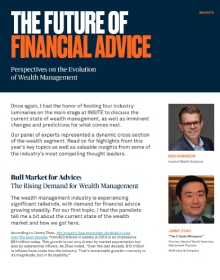
The Future of Financial Advice: Perspectives on the Evolution of Wealth Management
Related Content
Ask how we can help transform your business

